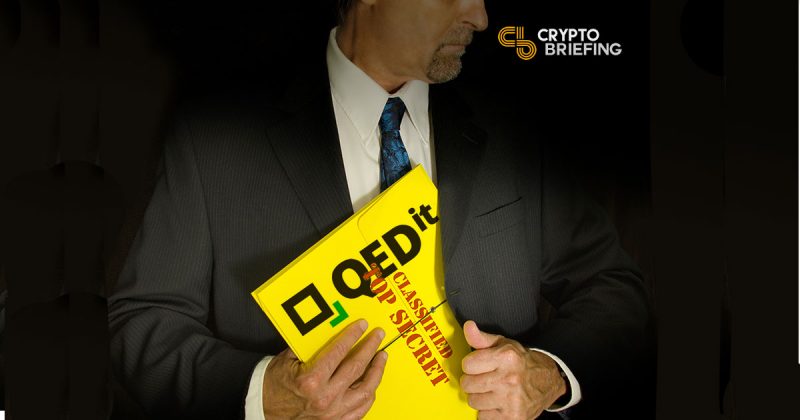
Privacy Protocols Could Be Good For Business
Privacy coins normally have a tough time. But as QED-it's CEO explains, many businesses will only adopt blockchain if transactions can be kept private.
Anonymous cryptocurrencies are still controversial, and are more often associated with the dark web than with the corporate establishment. Privacy coins have had a hard time with regulators, and are even outlawed in Japan, an otherwise crypto-friendly jurisdiction.
But a new project, which uses the same algorithm as Zcash (ZEC), thinks it can legitimize privacy protocols. In fact, they believe that private transactions will become the gateway for established businesses to adopt blockchain technology.
QED-it (pronounced KED-it) is a privacy layer, which allows data to be stored and transferred securely on any decentralized network. To ensure data remain private, the protocol uses the zk-SNARKS algorithm.
zk-SNARKs allow transactions to be validated without having to reveal specific details. QED-it – a play on the Latin acronym for “what was to be demonstrated” – provides a confidential and regulatory-compliant means for businesses to transfer information.
Jonathan Rouach, QED-it CEO and co-founder, says that privacy protocols could make blockchains viable for corporate use. Calling from Israel, he told Crypto Briefing that businesses are hesitant to use ledgers which make their transactions publicly visible. Not only could these platforms expose confidential information, he said, they could give competitors a crucial advantage.
Blockchain for business
Public enthusiasm for cryptocurrencies has waned since 2017, but corporations remain interested in blockchain technology. Some are testing DLT solutions to the primary problems that affect their businesses.
Financial institutions, like banks, see blockchain as a new channel for transferring value around the world. Just this year, HSBC said it was trialing blockchain for its $250bn FX trading business, and JPMorgan Chase unveiled its own JPM Coin for international settlements in mid-February.
“Anything where you’re trying to create a record of ownership — mortgage ownership, liens in lending, where you can go back and create a chain of ownership, it [blockchain] is very impactful,” said Mike Corbat, CEO of Citigroup, to the Financial Times.
Rouach emphasized that QED-it has a wide variety of potential use-cases. Accountancy firm Deloitte experimented with the protocol as a means to prove a client’s tax-bracket for the authorities without having to divulge financial information. It has also been trialed as a means to schedule maintenance for military aircraft without disclosing sensitive details, such as flight patterns.
“We’re trying to turn this technology into an enterprise solution,” Rouach said. The QED-it protocol can be built on top of any public or permissioned blockchain, he says. Although not yet fully operational, the company is confident it will have its first systems tested and deployed as early as this year.
Are zk-SNARKs safe?
zk-SNARKs – short for zero-knowledge succinct non-interactive arguments of knowledge – are considered among the best privacy technologies available. A DAR report published last September found that researchers could clearly identify senders of Monero (XMR) transactions – which uses a different privacy method – but not any Zcash sender, as Crypto Briefing reported at the time.
That said, there have been some criticisms. Some developers say the algorithm rests on several unproven cryptographic assumptions. No one has yet managed to break the algorithm, but the incentives increase as more companies adopt it.
But Rouach is unperturbed, pointing out that companies such as Deloitte, IBM and Microsoft are all contributing on standardized zero-knowledge proofs. “The cryptocurrency world has a taste for experimentation,” Roach said.
A constantly changing space
Transactions are visible on most public ledgers, and block explorers allow anyone with a basic understanding of blockchains to easily trace funds across wallet addresses. In the past, this has allowed Crypto Briefing to follow the movement of Stellar Lumens (XLM) tokens from a Foundation wallet to exchanges.
But established businesses are unlikely to expose themselves to that level of scrutiny. Rouach believes QED-it will be most popular among private chains, those that only selected parties are authorized to use.
Blockchain is a constantly changing space. Zcash, a project committed to the principles of decentralization, was zk-SNARKs’ first real-world application. The privacy algorithm may now find a new place in the workings of a centralized corporation.
The author is invested in digital assets, including BTC and ETH which are mentioned in this article.
